 We had a follow-up workshop for the OpEd Project at the College of Charleston last week, and it occurred to me during that workshop that I should write an op-ed about Sarah Josepha Hale being largely responsible for making Thanksgiving a national holiday. I'm not the only person who knows about this, but it doesn't seem to get a lot of attention on Thanksgiving anywhere but at Baxter Sez. Wouldn't it be cool if the New York Times or Washington Post had a piece about this forgotten woman?
We had a follow-up workshop for the OpEd Project at the College of Charleston last week, and it occurred to me during that workshop that I should write an op-ed about Sarah Josepha Hale being largely responsible for making Thanksgiving a national holiday. I'm not the only person who knows about this, but it doesn't seem to get a lot of attention on Thanksgiving anywhere but at Baxter Sez. Wouldn't it be cool if the New York Times or Washington Post had a piece about this forgotten woman?
However, things have been busy, so I didn't pull it together to write an op-ed. Maybe next year. For 2011, Hale's going to be on the blog rather than in a newspaper.
Sarah Josepha Hale (1788-1879) is one of the 19th c. women I studied back in the day, when I studied 19th c. women. Hale is responsible for Thanksgiving being a national holiday. As editor of Godey's Lady's Book, hands down the most popular magazine of its time, she was incredibly influential nationally, and she used her influence to argue for things like equal education for women, high-quality American literature, and Thanksgiving.
The United States only had one national holiday at that time: July 4. A lot of people celebrated Thanksgiving, but there wasn't a set day for it, and it wasn't nationally recognized. She lobbied the Presidents for 25 years about this issue, and finally Lincoln complied in 1863. She'd been saying for years that an additional holiday would help bring the country together, and during the Civil War Lincoln saw the symbolic significance of this.
So as you enjoy your day off, eat your turkey or tofurkey, and think about the native people whose land the Puritans stole, raise a glass in honor of Sarah Josepha Hale, who should be a national celebrity on Thanksgiving.
11.24.2011
Sarah Josepha Hale
11.22.2011
Check out Psychology Today
Head over to the Psychology Today website and see a post I was invited to write, called "Peter Singer: Espousing lack of human diversity, 20 years and counting." You all have read comments here and there from me about Singer, who is an incredibly important philosopher who's said some incredibly controversial things about human disabilities.
My colleague Jennifer Baker, who's a regular blogger at Psychology Today, wrote a post, and mine is a (sort of) response. Even though I'm articulating some of the "intense vitriol for Singer" which she notes "puzzles me a bit," she was incredibly gracious in her email back-and-forths with me, offering a lot of helpful explanations of the field of philosophy. And I think we do agree on one key point, which is that Singer didn't "cause" a disrespect for Down syndrome--he's voicing things that our culture already believes, and giving them additional credibility because of his status.
Okay, go over there and leave a comment. I think it may be a big conversation.
11.20.2011
Dingaderry
As I may have mentioned here before, Maybelle loves The Wizard of Oz movie. Loves it so much that I could probably recite/sing the movie to you, from Glenda's "Come out, come out, wherever you are!" to the Emerald City dwellers' "That's how we laugh the day away in the merry old land of Oz." (That's as long as she can go--most of the time she only watches from Munchkinland to the rescue of the Tin Man.)
She particularly loves the Scarecrow's song, and she's learning the lyrics and choreography.* All the moves she makes here are imitations of what the Scarecrow is doing. (Keep reading after the video, because I have a story.)
So, at the end of the song, after the Scarecrow has mused about all the things he could do if he had a brain, he sings, "I could dance and be merry, life would be a dingaderry, if I only had a brain."
Here's a conversation Biffle and I had about these lyrics.
Alison: What does that mean, "dingaderry"? What is that?
Biffle: It's just a word they made up. It rhymes and sounds fun.
Alison: Is it a particular kind of dance?
Biffle: No, I think they just made it up.
Alison: Do you have any evidence? Did you look it up on that "Straight Dope" website?
Biffle: No, but I'm 100% certain they made it up.
Alison: But he sings, "dance and be merry, life would be a dingaderry." Is that really what the people writing those lyrics thought was associated with having a brain? That's not what it means to have a brain. If he had a brain, he'd be all analytical, considering everything. He'd be, like, holed up in the library. Nobody thinks that having a brain means life would be a dingaderry.
Biffle: You're really stuck on this. Why do you care?
Alison: Because I have a brain! See--this is exactly what those lyrics are missing! If you have a brain, you think it's fun to stand in the kitchen analyzing the term "dingaderry"!
I thought I had a good point.
*Here's a tangential but related point about how cool the Wizard of Oz movie is. First of all, it has a female protagonist who doesn't ever become anybody's love interest, and she never gets rescued. She becomes part of a community, and they all look out for each other. That's remarkably rare. Second, the diverse (although all white) characters she joins in community with think that they're deficient--they're lacking brains, heart, courage--but in fact they all have those qualities in abundance, they just have to recognize them. So the movie isn't about people with lacks needing to be fixed; it's about funky, interesting folks who have all the qualities they need.
11.17.2011
Lists
Things I want to blog about:
- s.e. smith's post about why she's not a feminist
- George Estreich's book, The Shape of the Eye
- Jen Baker's post over at Psychology Today about the Lucas-like Peter Singer
- Gender identity and kids with cognitive disabilities (i.e. if my job is destabilizing gender norms, then why is it important that Maybelle learn them?)
- The Op Ed Project and how cool it is
Things I want to own:
- a pair of brown corduroy pants
- a pair of dark blue jeans
- running shoes
- three more professional shirts (and if they don't need ironing, all the better)
- black shoes that aren't scuffed all to hell
Things Maybelle says that are cute:
- "So beepy" (so sleepy)
- "No bee-tyou" (no thank you)
- "I want yeah yeah yeah" (a request to play the last several tracks from Abbey Road)
And unrelated to all these lists, go have a look at the additional point Jamie Huff made on my post about "The sentimentalized narrative, or 'God Bless the USA.'"
11.16.2011
NWSA 2011: Thoughts from back in Charleston
You may have noticed that I only had two days of NWSA thoughts, although I was at the conference for four solid days. This is evidence of how busy those four days were. Full from morning until night! So let me provide some highlights from my notebook of observations about the conference, and then we'll move on to other matters on Baxter Sez.
- At one point I wrote, "I never talk about 'methodology' in my writing. I have methodologies, but rarely (never?) do I map them out that way." It seems like all the grad students I saw talked about their methodologies right at the outset.
- There's apparently a children's book called Maybelle the Cable Car by the same author (a woman) who wrote the steam shovel book.
- Rachel Reinke has a colleague who's in WGS and refers to WGS scholars as "professionally offended." This relates to a point I made in the Program Administrators and Directors' pre-conference, where I pointed out Biffle's observation that WGS faculty use the word "appalled" way too much. There's a lot that's appalling, of course, but we don't want to be the field that's universally appalled or professionally offended. I talk about this in my essay in Rethinking Women's and Gender Studies, out in December.
- I had a wonderful date with Sujatha Jesudason and took a page of notes. One note of interest: how is it that talking about prenatal testing makes people think you're pro-life? Sujatha and I are both emphatically in favor of reproductive rights, and both questioning the role of prenatal testing.
- I had an extended conversation with my feminist cohort about fashion--namely, my lack of it. They all know that I hate shopping, and they generally endorsed Biffle's notion that I buy five outfits that are identical and wear them all week. In other words, dress like a man.
- And here's an example of how I'm trying to incorporate self-care into my life: there was a dance party Saturday night, but I was exhausted, so I went back to my room. I missed a dance party! That was a big step for me, and a bit sad. But I was really exhausted.
11.11.2011
NWSA 2011, day 2
Let me tell you about my day, in bullet points and photos:
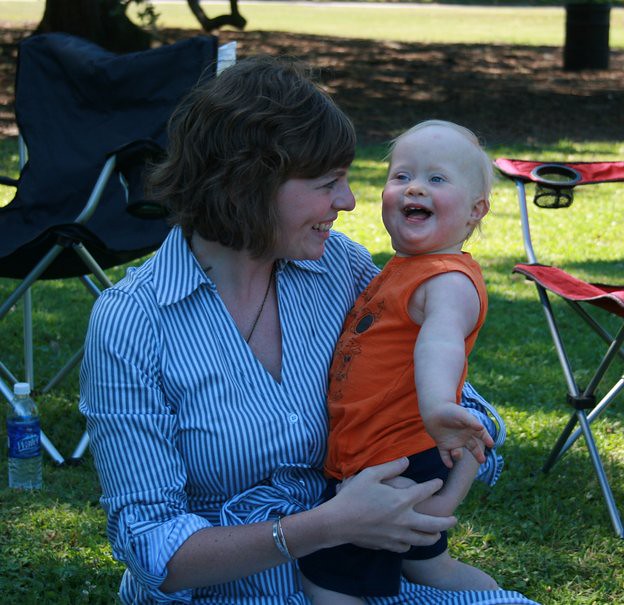
* Have been going 100 mph since 5:30am
* Went to a fun morning panel with presentations by Liz Groeneveld (who is doing great research into zines by girls and women--and quoted me!) and Jessalyn Keller, who's writing a piece for an edited collection that I'm also going to be in.
* Got reconnected with Rachel Reinke. She was amused at how many of my friends knew who she was when I said, "You know, I advised her bachelor's essay AND she was Maybelle's nanny the same year. She came to my house to do bachelor's essay advising after Maybelle went to bed." My friends said, "Oh! Right!"
* Took part in a fun roundtable presentation about blogging, with a bunch of my co-editors at Girl w/Pen. My big insight: I'm able to fit blogging into my already full life because it's really fun. Not all that chewy an insight, but true!
* Had a lengthy conversation with my editor at NYU. We decided that I'll plan to have the full book proposal, including a sample chapter, to her by the end of the summer.
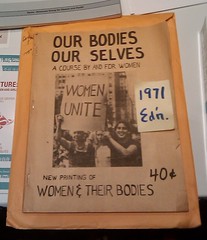 * Had a conversation with my new BFF, Judy Norsigian, one of the original members of the Boston Women's Health Book Collective that did Our Bodies, Ourselves. She seemed a bit surprised when I told her how honored I was to get to talk with her. She took my card!
* Had a conversation with my new BFF, Judy Norsigian, one of the original members of the Boston Women's Health Book Collective that did Our Bodies, Ourselves. She seemed a bit surprised when I told her how honored I was to get to talk with her. She took my card!
* After all that, I went to my room and napped during big afternoon plenary.
* Hung out with the gang at Karlyn's book signing, which was fun.
* Met up with Amanda Richey, a friend from childhood who I now only ever see at NWSA.
* Recognized how extensively I've been talking about the fact that I'm in therapy (well, it's important to my life, plus it's nothing new).
* I'm skipping out of an evening panel session that I was going to go see so that I can have some down time before dinner. I believe that 18 of us are going to dinner together (!!).
And in case you're concerned that maybe feminists aren't as frightening as you've been led to believe, here's a sticker that a major academic press gave me for my nametag:
11.10.2011
Alison's updates from the NWSA
Okay, I've had a great time at Day 1 of NWSA 2011. Here are some things I've learned:
- The US has 5% of the world's population, and 25% of the world's prisoners (this info from fascinating Ruth Gilmore, who is someone my Gender and Violence students will be hearing about).
- Women's and Gender Studies is the ideal liberal arts degree (thanks, Astrid!).
- If you Google "hysterectomy and NWSA," a Baxter Sez post from 2007 is the fifth item on the list (Karlyn gets credit for discovering this, and she'll write a book about it if I gnaw out my own uterus).
11.09.2011
Op ed!
Amber Cantrell and I finally got our op-ed published. We wrote it over the summer and have sent it to, I think, seven newspapers. Persistence pays off!
"Looking anew at Down syndrome" in The State.
11.08.2011
The sentimentalized narrative, or, "God Bless the USA"
Recently my friend from high school who is now a famous blogger, Tracy Moore, sent me an email in which she asked,
Have you seen this video about the kid with autism who makes a basketball hoop? People are posting this like crazy on Facebook lately, and it's one of those posts where everyone is going nuts for how much this "makes their day" and people watch it and comment and say that like anyone who doesn't cry when they see this video is dead inside and other assorted up with people type responses.
But when I watch the video -- it's a basketball game at a high school somewhere where they let this kid with autism shoot some hoops and he "miraculously" makes them and the crowd goes wild with happiness -- it just really makes me think of the conversation you have going on your blog about representations of intellectual disability.
First off, they are crazy hard shots to make, so it'd be cool to watch anyone nail like 18 points at the very last minute of a game. But I guess my problem with the video, as best as I can articulate, is along the lines of what you write about Down Syndrome depictions. If we act like it's some miracle from heaven that a kid with autism can make some baskets, isn't this setting shooting hoops as this really high bar that we are supposed to regard as amazing and rare? When really this probably isn't as exceptional as the video makes it?
Also, I barely know anything about autism aside from a story or two I've reported that relates to it, but I do know that there's a spectrum, and this news story says nothing about that, and just sets up the viewer to believe that this one kid represents "autism." Here is a kid with autism, it says. And that having autism means it's crazy rare to be able to shoot a basket. Intellectual disabilities -- do they always go hand in hand with physical ones? Meaning, is it weird to assume someone with an intellectual disability couldn't be good at basketball? It just seems incongruous to assume so.
Anyway, I'd love to hear your thoughts -- you may have already been sent it, but it'd be great to read your take on it. Maybe something for Baxter Sez if you need it.
I responded:
I've been hearing about that video, but Biffle and I watched it together this morning because of your email, and it represents a problem I've been planning to blog about, what I'm calling the sentimentalized narrative, the story that's "miraculous" or "absolutely amazing," that makes a room full of typical people weep and offer a standing ovation. It's just a version of the standard pity narrative, and it makes me a bit sick to my stomach.
We see versions of this narrative all the time, often--but not always--with sports. I've seen lots of videos of the kid who was the team "manager" who's allowed to suit up on the last day, at the last game, and is allowed to "play," with everybody keeping their hands off and making it all about the "special kid." (Okay, I'm getting weary of my own scare quotes, but you see what I mean). I've seen it with other basketball instances but also football and baseball. Why wasn't that kid allowed some meaningful inclusion during the whole season? This is where the Special Olympics is a nice contrast: those athletes train, work really hard, and compete meaningfully. And with this latest video: if that kid is that good at basketball (making six three-point shots, which seems pretty significant), why wasn't he an actual member of the team?
I saw a different version of this sentimentalized narrative a couple of days ago. A high school senior with an intellectual disability loved to sing, and through some parental maneuverings he got connected to a professional singer who came to the student's high school choral performance, pulled him up on stage with him, and together they sang--are you ready for this?--Lee Greenwood's "God Bless the USA." I'm in a ballroom where this video is shown. The audience of mostly typical adults is gasping. Tears are beginning to flow. I pulled out my cell phone and texted Biffle,
"I am watching a video of a 'special kid' singing proud to be an American. It's like a terrible parody of what I want Maybelle's opportunities to be. LH mercy."
Then, "He and [the professional singer] are really proud to be Americans. Ppl are weeping."
Then, "Standing ovation. Please let's not let that be Maybelle's future.
Biffle and I already had boatloads of scorn for "God Bless the USA." As he observes, we're jaded, so that's a song which presents a version of patriotism that we pretty thoroughly despise ("at least I know I'm free"? This is the reason you're proud?). Even more to the point, he says it's a song that offers no real emotion, but just pushes a button, like certain violin techniques in movies. You get to the end of the first verse, and you're supposed to start crying, and your body knows it, even though nothing meaningful has been offered. It is, itself, a sentimentalized narrative. This is why it's the perfect song to have the person with an intellectual disability sing. As a culture we're prepared to see them through a "bless their hearts" dehumanizing pity lens.
The audience didn't offer a weepy standing ovation because they realized that the student with the intellectual disability was a great singer (or a good basketball player, or even an interesting person to get to know). A billion people aren't posting the basketball video to Facebook because it's helped them to understand autism in a clearer, more complex way. Instead, it's the seemingly kind side of a toxic stereotype.
Okay, this email will probably become my blog post. Is it okay if I quote you to start it off?
--Alison
(She said yes.)
Editorial note: Here's an additional insight from brilliant graduate student Jamie Huff, who used to be a brilliant undergraduate in WGS at the College of Charleston:
I was thinking about the "God Bless the USA" song/conference moment we were talking about at breakfast. We talked about how the song says nothing, but I was thinking about how it also does more than that. The specific political representation of having a person with an intellectual disability sing this song erases the history of disability in the US. For example, how can this person with a disability really "at least know" that he or she "is free" in a county whose court system produced Buck v. Bell? Or needed the intervention of the ADA? Or that issues reports each year about how many people with disabilities die from neglect, ignorance, and outright violence in state-run group homes in New York (but doesn't do much to change it)? "God Bless the USA" simply pretends that those things didn't and aren't happening, and to do that is more than neglectful, it is violent (in the sense that my advisor uses the term "epistemic violence"). Sorry for the long email--I just had a serious critical theory moment with that song.
11.05.2011
Random updates
I've been out of town for two days, and Maybelle's been out of school (ECDC was closed while the teachers went to a conference), so Biffle and I have both been too busy to blog. I've been thinking of substantive posts, but instead, I'll provide a post with highlights of the last week.
Halloween
What a great holiday! At school, Maybelle made a construction paper jackolantern (which she referred to as "happy face"), and Biffle carved our at-home jackolantern as a replica.

Really good job, don't you think?
ECDC has a parade every year, where the kids wear their costumes and walk across campus:
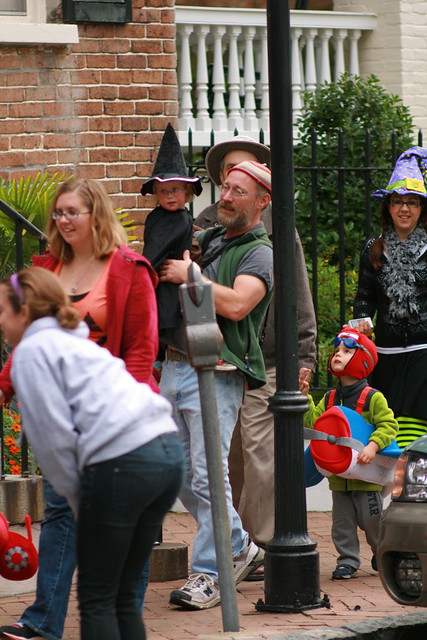
The parade ends on the Cistern, where Maybelle and lots of other kids ran frenetically around rather than standing still and singing the song they'd planned to sing.
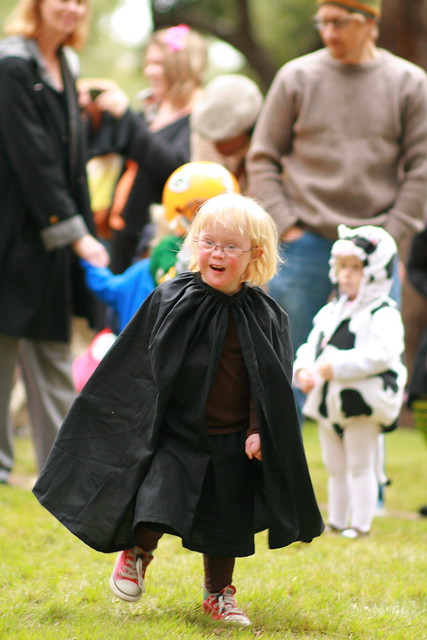
Then Halloween night, we participated in the Halloween tradition we've done since Maybelle was two months old: the party at my friend Lynne's house and subsequent trick or treating throng. This year Maybelle participated even more fully in the trick or treating. She went up to people's porches and said "Trick or treat," and then when they offered her candy, she said, "No bee-tyou" (no thank you). She doesn't like candy.
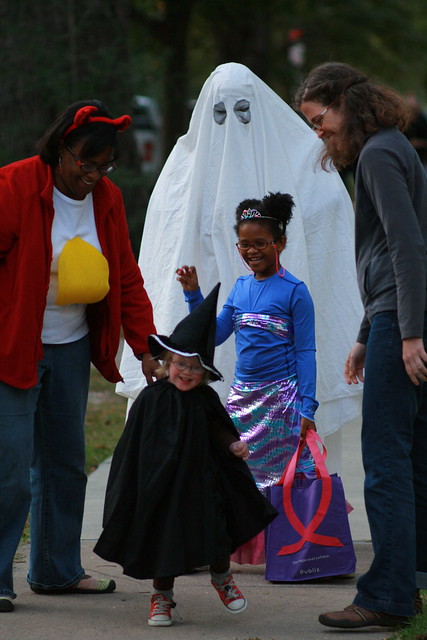
Getting to fully enjoy Halloween with Maybelle and my friends was a surprisingly big deal for me. The day felt so special--seeing her in her witch costume (thanks, Nonnie, for making such a great cape and skirt!), seeing her admire the pumpkin, have fun in the parade, give a try to trick or treating--these were surprisingly important moments. I had this sense of, Oh, yes, this is what I want in my life.
I have other things I might share--thoughts on the conference I attended, thoughts on the fabulousness of the College of Charleston's REACH Program (we actually are, I think, the best in the nation)--but rather than take this post off-track with academic musings, I'll end with the other big news from our household.
Gabe
The SPCA was having a big adoptathon today, and we went and adopted a one year old Great American Black Dog named Gabe.
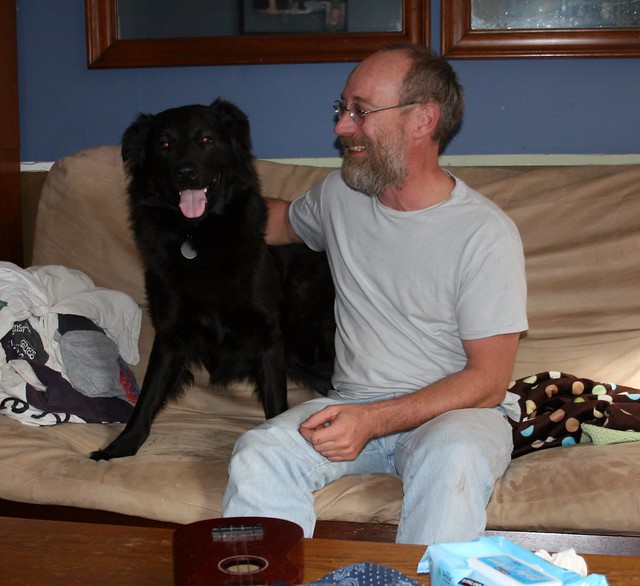
I have now known Gabe for four hours, and here's what I'd like to say:
- He has such a sweet face. That was one of the big things that got to us.
- He is quiet. In the four hours I've known him, he's barked once--and that was playfully, at George Jones. When he was in the adoptathon tent, 50 dogs were barking, squealing, howling, screaming, and he didn't say a word. Sirens went by our house this afternoon, and he looked up attentively but didn't break into a howl like some dogs do. A guy jogged by, and Gabe watched, his body poised for action, but he didn't bark. We'll have to see what he does when the school kids walk by (that was when Benya would let loose with bloodcurdling barks).
- It is a wonderful thing to have a dog in the house. Gabe is checking things out, clicking up and down the hallway, monitoring the front door thoughtfully, sniffing here and there, and it's incredibly comforting. It's comforting for a few reasons--because of safety (I love that attentive dog body that says, Don't even try to mess with this household) and also because of...what...the presence of another person? As I sat down to blog, he lay on the floor beside me, and he looked up at me just now while I was pondering what to write. I can stroke his face and get some pure affection. I really like having him here.
- Maybelle is waking up from her nap, and Gabe is letting me know that he heard some noise from the front of the house (i.e. Maybelle), so I'll sign off.



